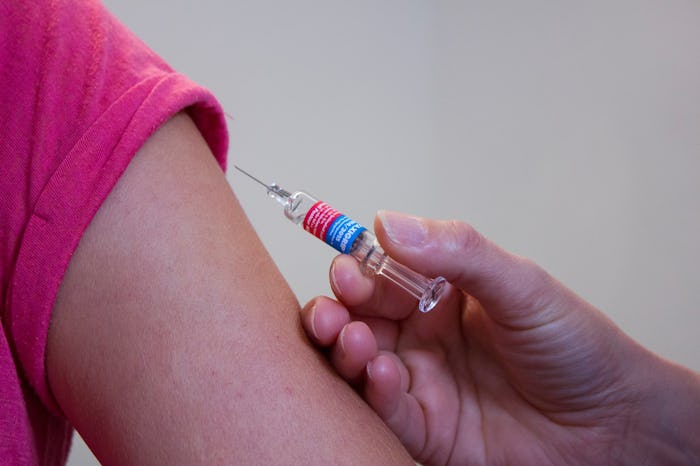On a base level, vaccinations help keep children (and adults) safe from disease, it's a powerful defense system that's been proven safe and effective. Vaccines can prevent disease outbreak and save lives. But what is herd immunity? You may have heard the term used before, but considering it has varied meanings, it can be hard to keep up.
According to the Oxford Journals, some use the term herd immunity to describe the proportion immune among individuals in a population. Additionally, some may use is "with reference to a particular threshold proportion of immune individuals that should lead to a decline in incidence of infection" while others use the term to refer to a "pattern of immunity that should protect a population from invasion of a new infection."
The easiest way to think of herd immunity, or community immunity, as the U.S. Department of Health and Human Services refers to it, is like this:
When a critical portion of a community is immunized against a contagious disease, most members of the community are protected against that disease because there is little opportunity for an outbreak. Even those who are not eligible for certain vaccines—such as infants, pregnant women, or immunocompromised individuals—get some protection because the spread of contagious disease is contained. This is known as "community immunity."
The illustration below depicts several different situations. The top box refers to a community where no one is immunized and an outbreak occurs. The middle box shows a population where some are immunized, but not enough to benefit from community immunity. And the bottom box shows a large portion of immunized citizens, which protects most community members. This bottom box is an illustration of community immunity, or herd immunity.
According to the U.S. Department of Health and Human Services, herd immunity applies to a variety of contagious diseases, including influenza, measles, mumps, rotavirus, and pneumococcal disease. However, if immunization rates fall, herd immunity can break down and increase the number of new cases of said contagious diseases. The United States saw the effects of herd immunity failing in 2010, when there was a large outbreak of pertussis, also known as whooping cough. The Los Angeles Times covered the break down of herd immunity, pointing to increases in not only whooping cough, but measles in the United States.
Dr. Paul Offit, director of the Vaccine Education Center at Children's Hospital of Philadelphia, told the Los Angeles Times that herd immunity was like having a moat around a castle, preventing the spread of disease, and making it more difficult for viruses and bacteria to spread. And yet, according to the National Vaccine Information Center, while no federal laws concerning vaccinations exist, 16 states allow philosophical exemption from vaccines.
If a parent has personal or conscientious objections to vaccines, they can file for a philosophical exemption from vaccines for their child. At the time of California's pertussis outbreak, the state allowed philosophical exemptions — which is believed to have been the cause of the outbreak, according to the aforementioned article in the Los Angeles Times. Interestingly enough, since the outbreak, California has since changed their state law on vaccinations, and effective July 1, 2016, school aged children who are not up-to-date on all mandated vaccine will be required to home school without options for classroom learning. Visit the Centers for Disease Control and Prevention to learn more on why you should vaccinate your child.
